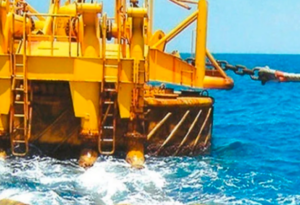The Greek parliament is set to ratify, through legislation, the amendment of the agreement concerning the geopolitical risk distribution for the Crete-Cyprus electric cable project, raising Greece’s share of the risk to 50%.
According to sources, the framework agreement between both parties includes the signing of a bilateral treaty, which the Greek government aims to pass through parliament, possibly as early as next week.
Under this agreement, even in the worst-case scenario where the project encounters issues, 37% of the damage would be covered by regulatory revenues, and 13% would come from the state budget. The geopolitical risk pertains to ADMIE’s (Independent Power Transmission Operator) recovery of expenses related to the cable, in case the project faces delays or disruptions due to force majeure, without ADMIE being at fault. This issue was also discussed during a recent meeting at Maximos Mansion (the Prime Minister’s office), where all potential scenarios were reviewed.
However, despite the recent positive progress concerning the cable, the Cypriot side has not yet resolved all matters. Since yesterday morning, Greece’s Ministry of Energy and Environment (ΥΠΕΝ) has been racing against time, in cooperation with the Cyprus Energy Regulatory Authority (RAAEY), to resolve one final issue. This is critical to avoid paying a €9.5 million penalty to Nexans, the company building the cable. The outstanding issue relates to a decision that will determine the revenue model and how it will impact Cypriot electricity consumers’ bills. This decision will approve the expenses that ADMIE has submitted to RAEK, and in combination with the WACC (Weighted Average Cost of Capital) and the revenue methodology approved by RAEK yesterday, the final revenue and its allocation to consumers will be determined.
RAEK has been delaying the process, with the ΥΠΕΝ working hard to resolve the matter within the next 24 hours. The goal is to have the issue settled by Monday, avoiding any penalties to the French, who are anxiously awaiting the “Final Notice to Proceed” for the project.
Unlocking the Next Step: Securing €100 Million for Cyprus’ Stake
The next major step to “unlock” the agreement is the disbursement of €100 million for Cyprus’ participation in the special purpose vehicle (SPV) that will be established for the project. Cypriot President Nikos Christodoulides has pledged to expedite this process. At present, the Cypriot side seems to have accepted that there will be no need to reassess the cost-benefit analysis study submitted by ADMIE. The decision has been made for Cyprus’ entry into the SPV to proceed with due diligence, aiming for completion by October-November.
Optimism surrounding the project has also been boosted by yesterday’s approval (despite the dissenting vote of RAEK’s Vice President) of an agreement to allocate €25 million annually to the entity overseeing the construction of the cable, for the recovery of expenses during the construction period (2025-2029). Another matter that was resolved is the approval of the capital return rate (premium WACC), extended from 12 to 17 years.
Ask me anything
Explore related questions





